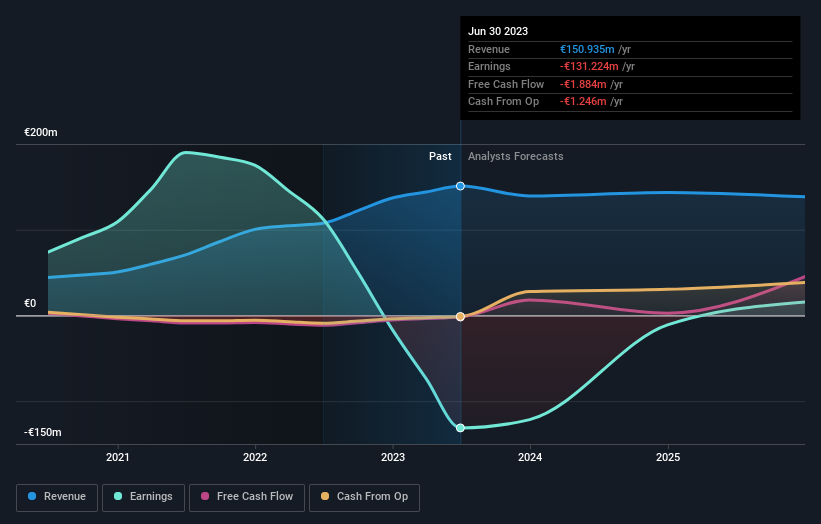Peach Property Group AG's (VTX:PEAN) largest shareholders are private companies with 43% ownership, individual investors own 30%
Key Insights
The considerable ownership by private companies in Peach Property Group indicates that they collectively have a greater say in management and business strategy
A total of 5 investors have a majority stake in the company with 53% ownership
If you want to know who really controls Peach Property Group AG (VTX:PEAN), then you'll have to look at the makeup of its share registry. With 43% stake, private companies possess the maximum shares in the company. In other words, the group stands to gain the most (or lose the most) from their investment into the company.
Individual investors, on the other hand, account for 30% of the company's stockholders.
Let's delve deeper into each type of owner of Peach Property Group, beginning with the chart below.
See our latest analysis for Peach Property Group
What Does The Institutional Ownership Tell Us About Peach Property Group?
Many institutions measure their performance against an index that approximates the local market. So they usually pay more attention to companies that are included in major indices.
Peach Property Group already has institutions on the share registry. Indeed, they own a respectable stake in the company. This suggests some credibility amongst professional investors. But we can't rely on that fact alone since institutions make bad investments sometimes, just like everyone does. It is not uncommon to see a big share price drop if two large institutional investors try to sell out of a stock at the same time. So it is worth checking the past earnings trajectory of Peach Property Group, (below). Of course, keep in mind that there are other factors to consider, too.
Hedge funds don't have many shares in Peach Property Group. Peak Investment S.À R.L is currently the company's largest shareholder with 30% of shares outstanding. With 8.2% and 6.3% of the shares outstanding respectively, Arquus Capital N.V. and Horizon21 are the second and third largest shareholders.
Our research also brought to light the fact that roughly 53% of the company is controlled by the top 5 shareholders suggesting that these owners wield significant influence on the business.
While it makes sense to study institutional ownership data for a company, it also makes sense to study analyst sentiments to know which way the wind is blowing. There are a reasonable number of analysts covering the stock, so it might be useful to find out their aggregate view on the future.
Insider Ownership Of Peach Property Group
The definition of company insiders can be subjective and does vary between jurisdictions. Our data reflects individual insiders, capturing board members at the very least. The company management answer to the board and the latter should represent the interests of shareholders. Notably, sometimes top-level managers are on the board themselves.
Most consider insider ownership a positive because it can indicate the board is well aligned with other shareholders. However, on some occasions too much power is concentrated within this group.
Our data cannot confirm that board members are holding shares personally. It is unusual not to have at least some personal holdings by board members, so our data might be flawed. A good next step would be to check how much the CEO is paid.
General Public Ownership
The general public-- including retail investors -- own 30% stake in the company, and hence can't easily be ignored. This size of ownership, while considerable, may not be enough to change company policy if the decision is not in sync with other large shareholders.
Private Company Ownership
We can see that Private Companies own 43%, of the shares on issue. Private companies may be related parties. Sometimes insiders have an interest in a public company through a holding in a private company, rather than in their own capacity as an individual. While it's hard to draw any broad stroke conclusions, it is worth noting as an area for further research.
Next Steps:
It's always worth thinking about the different groups who own shares in a company. But to understand Peach Property Group better, we need to consider many other factors. For example, we've discovered 4 warning signs for Peach Property Group (1 is potentially serious!) that you should be aware of before investing here.
If you are like me, you may want to think about whether this company will grow or shrink. Luckily, you can check this free report showing analyst forecasts for its future.
NB: Figures in this article are calculated using data from the last twelve months, which refer to the 12-month period ending on the last date of the month the financial statement is dated. This may not be consistent with full year annual report figures.
Have feedback on this article? Concerned about the content? Get in touch with us directly. Alternatively, email editorial-team (at) simplywallst.com.
This article by Simply Wall St is general in nature. We provide commentary based on historical data and analyst forecasts only using an unbiased methodology and our articles are not intended to be financial advice. It does not constitute a recommendation to buy or sell any stock, and does not take account of your objectives, or your financial situation. We aim to bring you long-term focused analysis driven by fundamental data. Note that our analysis may not factor in the latest price-sensitive company announcements or qualitative material. Simply Wall St has no position in any stocks mentioned.

 Yahoo Finance
Yahoo Finance 

